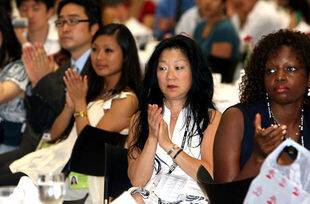hankyoreh
Links to other country sites 다른 나라 사이트 링크
[Editorial]Stop intercountry adoption

The fourth meeting of the International Korean Adoptee Associations (IKAA) is being held until Saturday in Seoul. Approximately 650 adoptees who have been separated from their birth parents are said to be in attendance. These adoptees were once neglected in the country of their birth, so it is sorrowful to have them come to Korea again out of a sense of longing. Repeating the talk about how we are “the same minjok” (people) or “of the same pitjul” (bloodline) only sounds like lip service in the face of their irreplaceable loss, since today as well, a few more newborn babies will board planes on their way to adoptive parents.
These individuals who have returned, though they have grown up so well, are like a thorn piercing Korea’s conscience. This thorn serves as a reminder of the fact that Korea, the “country that exports babies,” still sends some 2,000 children intercountry every year. And yet it is only at times like these that we allow ourselves to be reminded. We go about life forgetting - until they return again, when we say “we’re sorry” and “thank you” and then go back to the usual. This is a process that has continued for decades.
This time around, however, some of the people who want to see it stop are taking a stand. Adoptees and mothers who have sent children intercountry have begun collecting one million signatures calling for an end to intercountry adoption. It is an appeal calling for an end to the repetition of their experiences. This time, surely, they must not be neglected. Instead of statements about how Korea is going to promote domestic adoption or work to improve how society sees adoption, there needs to be an immediate and specific way to end intercountry adoption.
Some might question whether things can be changed overnight, but in fact the situation is different. Of the 1,899 children sent intercountry for adoption last year, 1,890 were the children of single mothers. If we make conditions such that single mothers can raise their children on their own, or raise them with help from their immediate communities, fewer of these women would send their newborn babies to strange foreign lands because they feared being ostracized in Korean society. A decent program for single mothers would contribute to a significant reduction in the number of children sent for intercountry adoption.
Discussions about increasing domestic adoption or changing how society improves adoption can come later. The only thing that discussing a long-term response, while neglecting the work that would have an immediate effect, does is make people doubt your sincerity.
Stopping intercountry adoption is more about very basic human rights for children than it is about any grand slogans about how “we should bear responsibility for our own minjok.” Article 9 of the United Nations Convention on the Rights of the Child declares that “a child shall not be separated from his or her parents against their will.” There is no justification for one of the world’s top ten powerhouses to ignore so basic a human right.
Editorial・opinion
![[Column] Has Korea, too, crossed the Rubicon on China? [Column] Has Korea, too, crossed the Rubicon on China?](https://flexible.img.hani.co.kr/flexible/normal/500/300/imgdb/original/2024/0419/9317135153409185.jpg) [Column] Has Korea, too, crossed the Rubicon on China?
[Column] Has Korea, too, crossed the Rubicon on China?![[Correspondent’s column] In Japan’s alliance with US, echoes of its past alliances with UK [Correspondent’s column] In Japan’s alliance with US, echoes of its past alliances with UK](https://flexible.img.hani.co.kr/flexible/normal/500/300/imgdb/original/2024/0419/2317135166563519.jpg) [Correspondent’s column] In Japan’s alliance with US, echoes of its past alliances with UK
[Correspondent’s column] In Japan’s alliance with US, echoes of its past alliances with UK- [Editorial] Does Yoon think the Korean public is wrong?
- [Editorial] As it bolsters its alliance with US, Japan must be accountable for past
- [Guest essay] Amending the Constitution is Yoon’s key to leaving office in public’s good graces
- [Editorial] 10 years on, lessons of Sewol tragedy must never be forgotten
- [Column] A death blow to Korea’s prosecutor politics
- [Correspondent’s column] The US and the end of Japanese pacifism
- [Guest essay] How Korea turned its trainee doctors into monsters
- [Guest essay] As someone who helped forge Seoul-Moscow ties, their status today troubles me
Most viewed articles
- 1[Column] The clock is ticking for Korea’s first lady
- 2Hong Se-hwa, voice for tolerance whose memoir of exile touched a chord, dies at 76
- 3[Column] Has Korea, too, crossed the Rubicon on China?
- 4After 2 months of delayed, denied medical care, Koreans worry worst may be yet to come
- 5[Correspondent’s column] In Japan’s alliance with US, echoes of its past alliances with UK
- 6All eyes on Xiaomi after it pulls off EV that Apple couldn’t
- 7[Photo] Smile ambassador, you’re on camera
- 8US overtakes China as Korea’s top export market, prompting trade sanction jitters
- 9S. Korea “monitoring developments” after report of secret Chinese police station in Seoul
- 1075% of younger S. Koreans want to leave country